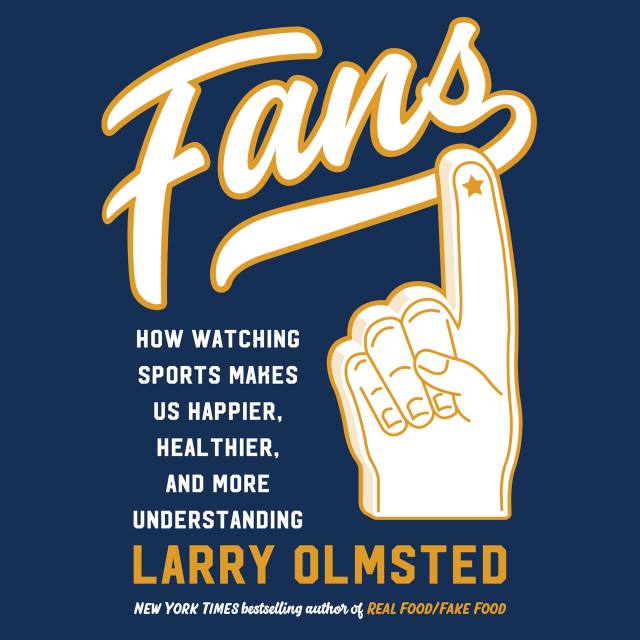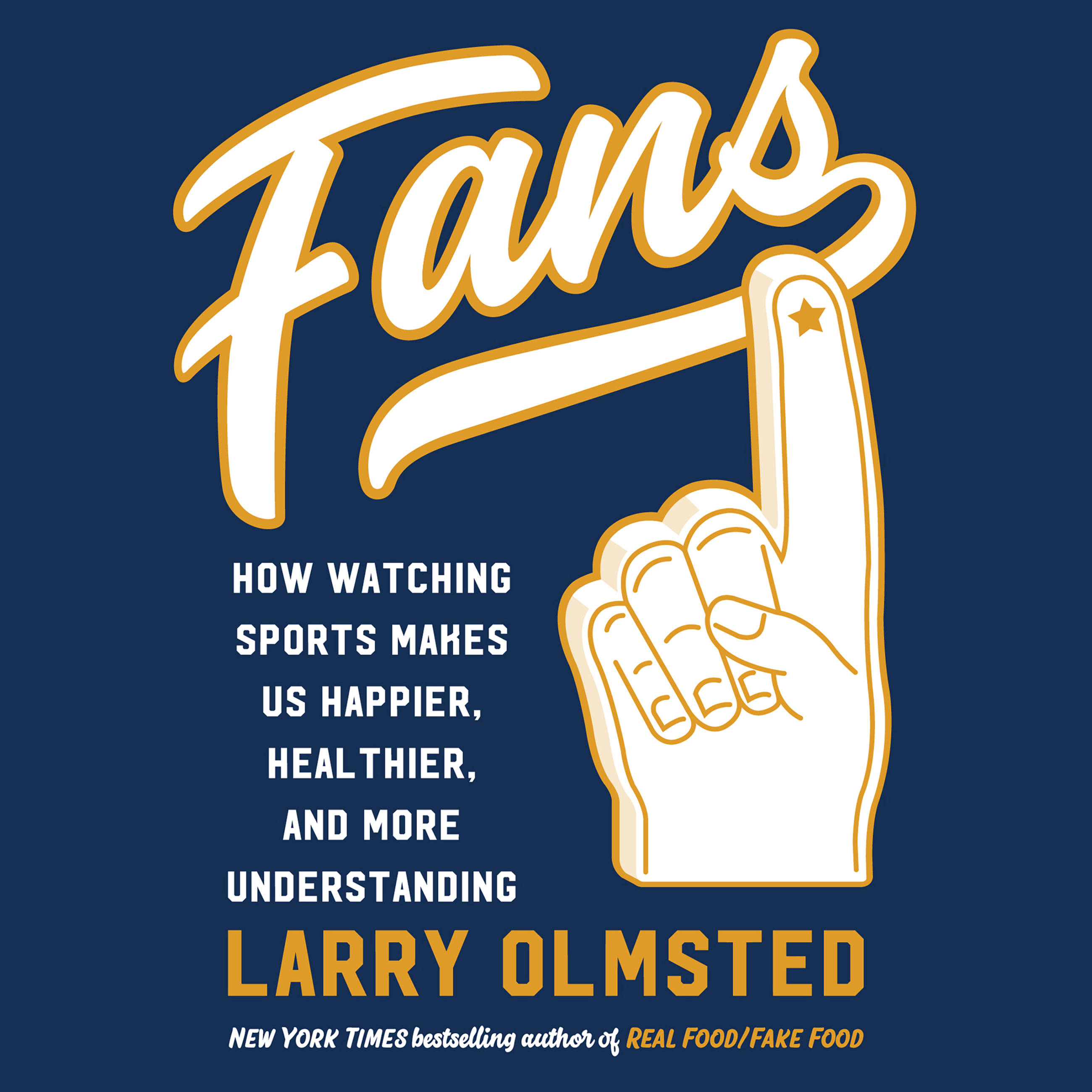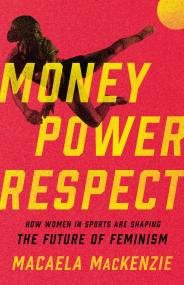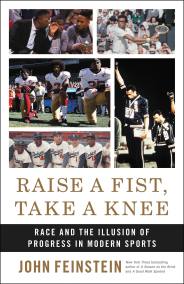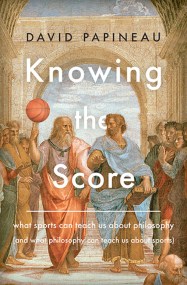“A deeply researched and persuasive exploration of the benefits of our mysterious athletic obsession.”
I>The Washington Post, sports columnist Jerry Brewer
“Olmsted probes deep into the minds and machinations of the devoted sports fan and, in the process, opens a window into a psychologically compelling world of passion and purpose.”
—Harvey Araton, author of Our Last Season: A Writer, A Fan, A Friendship
“Fun and fascinating. Fans is Exhibit A, showing our that our sports obsession is good for our health!”
—Andrew Blauner, editor of Coach: 25 Writers Reflect on People Who Made a Difference
“Olmsted writes accessibly, and his work will engage readers of all ages. While there have been other books written about fandom, this is a quick read that even casual fans of sports may enjoy.”
– Library Journal
“For sports fans feeling even slightly guilty over parking themselves in front of a TV for a few hours to watch, say, a football game, this volume offers a winning counterargument: It’s good for your health! Olmsted’s study offers ideas fans would do well to take seriously.”
– Booklist
“Olmsted’s book put me in the stands, wearing my jersey and cheering—for myself! I can now unashamedly paint my face and sing fight songs, because it turns out being a rabid fan is good for my health. A must-read for any sports fan!”
—Michael Patrick Shiels, syndicated talk show host
“Compelling . . . entertaining.”
I>Kirkus Reviews
Praise for Real Food/Fake Food:
A New York Times Bestseller * A Washington Post Bestseller * A National Post Bestseller (Canada)
“Olmsted’s well-researched exposé reveals how often what we eat isn’t what it seems. (Parmesan cheese made of wood pulp or fake lobster rolls, anyone?) Eye-opening.”
B>People
“Olmsted boldly walks readers through a course in food authenticity that covers olive oil, cheese, Champagne, seafood, steak, coffee, and more. Readers will be inspired by his intensity and clarity, and floored by how far some counterfeiters go to fool consumers and some historic food institutions go to protect their products and their names. Olmsted’s research is impressive, and he lets no stone go unturned. He lets the terrifying facts speak for themselves, adding just a little humor . . . Olmsted’s sharp language will hopefully put fires under counterfeiters everywhere . . . With the guiding hand of a good friend and prose that keeps the reader’s eye moving, Olmsted insists that readers ‘shop better and cook more.’”
B>Publishers Weekly, starred review
“Equal parts foodie chronicle and investigative exposé . . . Real Food/Fake Food is less treatise than guidebook, showing readers how to navigate an increasingly complex food system.”
B>Outside magazine
“Required reading for cooks who genuinely care about quality and health . . . a fascinating read that sheds light on our under-regulated food industry. The book also serves as a handy guide to what items consumers should avoid, and how to find and identify the real deal.”
B>CookingLight.com
“A striking look at the food industry. It’s unnerving that so many people don't know what authentic olive oil or port wine tastes like because they’ve been undersold on some off-shoot knock off and no one is raising a flag /B> until now.”
/B>Ming Tsai, author, chef, and host of PBS’s Simply Ming
“Larry Olmstead makes you insanely hungry and steaming mad in this provocative account of how fraud threatens not just the world’s great craft foods (think caviar, Kobe beef, and Parmigiano-Reggiano) but our everyday diet. A must-read for anyone who cares deeply about the safety of our food and the welfare our planet.”
/B>Steven Raichlen, author of the Barbecue! Bible cookbook series and host of Project Smoke and Primal Grill on PBS
“Fun and fascinating. Fans is Exhibit A, showing us that our sports obsession is good for our health!”
—Andrew Blauner, editor of Coach: 25 Writers Reflect on People Who Made a Difference
“Do not take another bite or swallow another sip of anything, for your sake and the sake of your children, before reading Real Food Fake Food. It is the health equivalent of Ralph Nader's expose Unsafe at any Speed. The content blows the doors off the kitchens.”
—Michael Patrick Shiels, radio host and author of Invite Yourself to the Party
“Larry Olmsted’s meticulously researched tour de force is chilling for what he uncovers about the food industry. At the same time his love of great food and his skill in writing about it make me want to try every one of the real foods he recommends. A must-read for anyone with an interest in, well, eating.”
—Dan Dunn, author of American Wino: A Tale of Reds, Whites and One Man’s Blues
“The world is full of delicious, lovingly-crafted foods that embody the terrain, weather, and culture of their origins. Unfortunately, it’s also full of brazen impostors that are hard to identify. In this entertaining and important book, Larry Olmsted helps us fall in love with the real stuff and steer clear of the fraudsters. I'll never look at a menu the same way again.”
/B>Kirk Kardashian, author of Milk Money: Cash, Cows, and the Death of the American Dairy Farm
“In his solidly researched new book, USA Today food and travel columnist Olmsted, a well-traveled and knowledgeable food writer, takes readers on an enlightening but frequently disturbing culinary journey. While providing fascinating insights into where and how some of the most delicious food products are produced, the author also reveals how often these are imitated to detrimental effect…A provocative yet grounded look at the U.S. food industry.”
B>Kirkus Reviews
“This is an important book to help all buyers shop prudently and with a wary eye toward the claims of food producers. Recommended for all consumers along with policymakers, those interested in food science, and marketing professionals.”
B>Library Journal
“Olmsted gives us the lay of this seedy landscape with momentum and aplomb. He demystifies the process by which fake ingredients end up in your shopping cart, explains why some of these deceitful foods could be a real threat to your health, and sheds a light on the government policies and shortsighted commercialism that landed them there.”
Mother Jones
